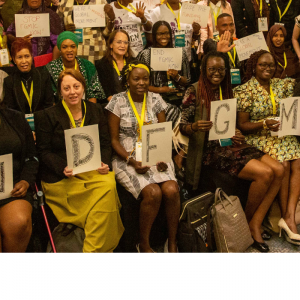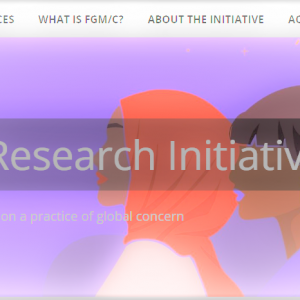As the world continues to grapple with the impact of the COVID-19 pandemic, which has brought pre-existing inequalities and gender-based violence into sharp focus, the Generation Equality Forum offers a once-in-a-generation opportunity for everyone to come together and catalyse change for gender equality. The forum marks 25 years since the landmark international conference on women’s rights took place in China, launching the Beijing Platform for Action, a comprehensive framework for women’s empowerment and gender equality.
Over the course of the three-day session, Generation Equality Forum participants will hear from the leaders of six Action Coalitions, each of which will present a blueprint of actions that coalition members will take to achieve their stated goals by 2026. Together, these blueprints comprise a Global Acceleration Plan for Gender Equality.
The impact that COVID-19 has had on efforts to end the practice of female genital cutting (FGC) means that there will be an additional two million cases in the next 10 years than would otherwise have occurred. We know that we cannot achieve gender equality if we fail to end FGC and the time to act is now.
We at Orchid Project are proud to join the movement that is seeking to break down the most intractable barriers to equality and justice and bring about irreversible progress for gender equality. As a Commitment Maker, we have made a pledge to achieve two advocacy and programmatic commitments in the next two years.
When designing our commitments, we took every step to ensure that the resourcing needed to achieve them is available, that they are grounded in rigorous evidence, and that they both draw on and strengthen our existing networks and strategic partnerships.
Commitment (1): supporting gender transformative approaches to end FGC
The practice of FGC is a reflection of deep-rooted inequality between the sexes. It is underpinned by and perpetuates discriminatory gender norms around the control of girls’ and women’s sexuality, bodies, and ultimately their lives.
Considering that gender inequality is a root cause and driver of the practice, specific gender transformative interventions which acknowledge and address harmful gender norms are required to achieve sustained positive change.
Orchid Project will commit to leading evidence-driven prevention programming by exploring the potential of gender transformative approaches to ending FGC. Leveraging our existing networks and a growing movement to end the practice, we will produce research and evidence focussed on gender transformative approaches in programmes and interventions seeking to end the practice. We will then utilise our expertise and research to build the capacity of grassroots organisations seeking to implement gender transformative approaches in the work they undertake with communities.
Commitment (2): reducing the prevalence of FGC
Orchid Project is engaged in a consortium programme with the Coalition on Violence Against Women (COVAW), S.A.F.E. Kenya and their SAFE Maa and SAFE Samburu teams to accelerate an end to the practice within the Maasai and Samburu communities in Kenya.
We know that whole communities need to be engaged in the process to end a deeply entrenched practice like FGC. Our partners in Kenya are making sure that is happening by creating space for dialogue and reflection between all community groups and providing them with the knowledge and tools they need to decide to end the practice for themselves.
Orchid Project will commit to reducing the rate of prevalence of FGC within the Masaai and Samburu communities in Kenya by 10 to 19 percentage points. We will achieve this through sustained community dialogue and knowledge sharing, building the capacity of grassroots organisations working to end the practice, and adhering to robust monitoring and evaluation systems.
Generation Equality Forum is indeed an unprecedented opportunity for all of us to achieve transformative change through the power of activism, feminist solidarity and youth leadership. What comes next in the next stage is crucial and while we forge ahead with the work we need to do to achieve our commitments, we hope that global leaders make good on theirs through concrete action and adherence to robust accountability mechanisms.
Image credit: Generaiton Equality Forum






